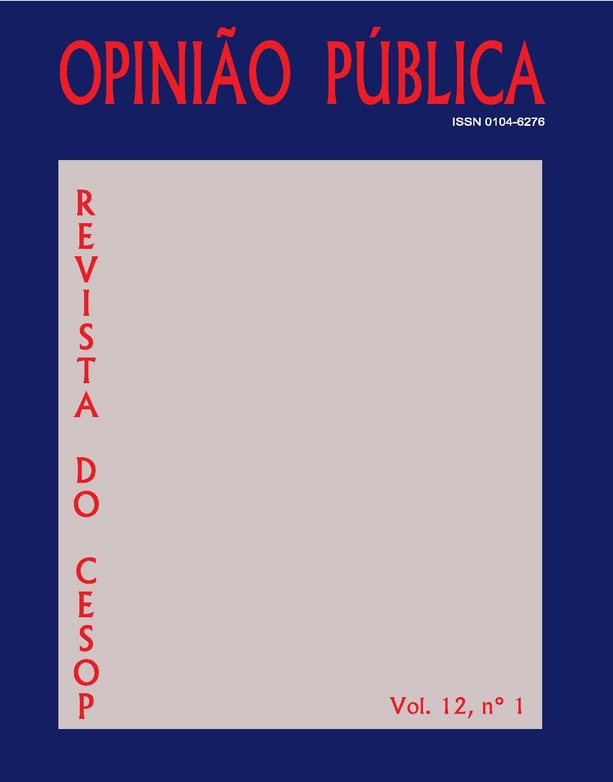Opinião Pública – Vol. 12, Nº 1 2006
Articles in this issue
Authors: Mitchel A. Seligson, John A. Booth e Miguel Gómez B.
Recent steep declines in trust in government among the mass publics of institutionalized democracies have rekindled interest in legitimacy theory and research. Theorists have long conceived of political legitimacy as multidimensional, and argue that it ranges from abstract support for a political community underlying regime principles to the more concrete evaluation of regime performance, institutions, and actors. However, surprisingly little empirical research has evaluated the theory’s construct validity. Employing a national sample survey from Costa Rican, a stable and successful democracy, we explore whether political legitimacy empirically exists and examine its structure. Using confirmatory factor analysis, we find evidence supporting the multidimensional structure of political support. We also identify certain limitations with both the theoretical and limited empirical research, related to misleading operationalization and the specification of empirical links that we fail to detect. We also find and remedy a surprising error of omission – that prior research overlooked local government as a target of legitimacy beliefs.
Authors: Elizabeth Balbachevsky e Denilde Oliveira Holzhacker
This paper analyzes the possible impacts of the privatization process implemented by the Brazilian former President, Fernando Henrique, over the attitudes and opinions held by Brazilian electorate regarding the presence of the state in the economy. Te paper uses a post-electoral survey from 2002 – The ESEB (Brazilian Electoral Study) data-base – supported by CAPES Foundation. The inquiry carried out in the paper centers on different patterns found in the answers given by the respondents when asked which sector – either government or private one – should be in charge of providing different products and services. The study found out an impressive degree of coherence in the answers given by the respondents, which were used to propose a scale for different attitudes regarding the privatization process. Furthermore, it was possible to establish significant correlation between this attitude and the electoral campaign and the declared vote of the respondent.
Author: Eva-Maria Trüdinger
American tolerance research traditionally discusses the influence of education on political tolerance. These debates are transferred into a German context, and the article aims to complement previous research on tolerance by a combination of value-based explanations, of findings about mass belief systems and about heuristics in decision-making. It is assumed that the levels of education and political sophistication of a person determine his/her attitudes on political tolerance, because they have an impact on the relevance of values and ideological dispositions as abstract principles for individual decisions on tolerance situations. As a result of our empirical analyses, we can emphasize the separate influence of political sophistication and the contextual nature of tolerant attitudes, partly due to individual differences in the handling of abstract principles.
Author: Fernando Antônio Azevedo
Using Hallim and Mancini’s models of analysis to compare media and political systems, the article describes, classifies and discusses the brazilian case in the recent democratic period, having as focus the political jornalism behaviour. The electoral press coverage during the presidential elections (1989, 1994, 1998 and 2002) and the changes in regard to external and internal diversity of the media system are emphasized, as well as its capacity to promote a pluralist debate.
Authors: Renato M. Perissinotto e Mariana B. Braunert
Although most of the studies on political culture stress on attitudes of the population as a whole, some researchers have dedicated their attention to the political values of the national political elite. We believe that the same attention must be paid to the political attitudes of regional political elites, since they operate central parts of the political system (the sub-national units of the political system). This article analyses the political opinions of the members of the Paraná state parliament, based on data collected by a survey. We intend to indicate the importance of the “ideological position” variable to understand the differences in the intensity of the adhesion to the democratic system between the right and left wing members of the Paraná state parliament.
Author: Yan de Souza Carreirão
This article analyses the ideological patterns of coalitions performed at the elections for governor, federal representative, state representative and mayor, between 1986 and 2004, in Santa Catarina. The main goal is to verify to what extent ideology constitutes an obstacle to the making of “inconsistent” coalitions and if there are changes in the coalitions patterns, along the period at study. The analysis reveals that at the beginning of the operation of the current party system the proportion of ideologically inconsistent coalitions was small, in relation to the candidatures as a whole. As time passed by, however, the proportion of ideologically inconsistent coalitions increased substantially.
Author: Francisco Paulo Jamil Almeida Marques
This article examines specific questions about democracy and digital technologies of communication. The paper begins presenting the notion of public sphere as a guide to evaluate the possibilities of a virtual version of this discursive space. Then, it discusses certain arguments offered by authors for and against the notion of virtual public sphere. Such arguments give the necessary background to develop the proposal of virtual public sphere neither as a genuine discursive space nor as a space that refuses the requisites of a normative public sphere. In other words, this paper defends that most of the discursive spaces found in the internet act in a more efficient way as places dedicated to what is called civic conversation. Most of the debates in lists and online forums serve as a way to improve the given and take of opinions. The conclusion considers that democracy has through the internet an alternative way to foster citizen’s participation.
